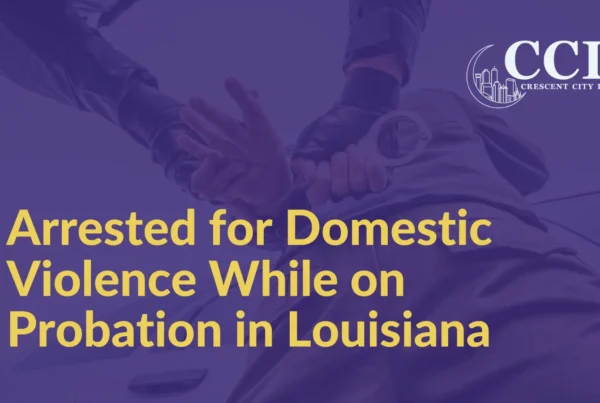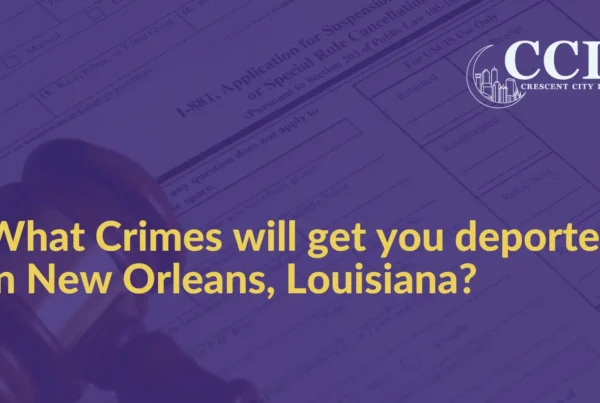At Crescent City Law in New Orleans, we understand how overwhelming and emotionally charged protective order cases can be. With years of experience defending the rights of individuals across Louisiana, our team works hard to make sure your story is heard and your rights are protected. If you or someone you care about is facing a protective order, we’re here to help. You can contact us, meet our team, or explore our criminal defense services to get started.
Understanding Louisiana’s Civil Protective Orders
Protective orders are court-issued documents meant to keep individuals safe from domestic abuse, dating violence, stalking, and sexual assault. Louisiana offers civil legal remedies that allow victims to petition the court directly, without needing a criminal charge to be filed.
Types of Civil Protective Orders in Louisiana
Louisiana law allows courts to issue protective orders under several key statutes:
- Domestic Abuse Assistance Act (La. R.S. 46:2131 et seq.)
- Protection from Dating Violence Act (La. R.S. 46:2151)
- Protection from Stalking Act (La. R.S. 46:2171 et seq.)
- Protection for Victims of Sexual Assault Act (La. R.S. 46:2181 et seq.)
These laws provide a legal pathway for victims to request protective measures such as stay-away orders, custody decisions, and financial support.
Key 2025 Updates from the LPOR Quick Reference Guide (v15.1)
The Louisiana Protective Order Registry (LPOR) ensures protective orders are properly recorded and accessible to law enforcement. As of 2025, several key changes are now in effect:
Mandatory Use of Uniform Abuse Prevention Order Forms
To maintain consistency and accuracy, Louisiana courts now require the use of LPOR Forms 1 to 25 for all civil protective orders. These are:
- Mandatory and may not be altered
- Transmitted to the LPOR by the clerk of court
Courtesy Forms Are Optional
Forms labeled LPOR A through Y serve as helpful guides but are not required. Examples include:
- LPOR A – Instructions for domestic abuse/dating violence petitions
- LPOR Y – Petition templates for stalking or sexual assault cases
These forms are created for convenience but are not sent to the LPOR.
New Forms for Reconvention Filing
In some cases, protective orders are filed as a response to an existing case. These are known as “reconvention” filings, and new courtesy forms have been added to support them:
- LPOR D-R – For stalking/sexual assault petitions filed in reconvention
- Forms ending in “-R” (e.g., LPOR C-R) indicate reconvention versions
Act 89: Considering Past Abuse and Financial Control
Under Act 89 (2024), courts must now consider the history of domestic abuse and patterns of financial control when dividing community property. This update reflects a growing understanding of how abuse can be financial and not just physical.
Act 225: Expanded Order Types and Protections
Act 225 has broadened the LPOR’s scope to include:
- Orders protecting witnesses, not just victims
- Orders related to crimes of violence, not only abuse
This law also removes language requiring the protective order to be tied to a specific act of violence or harassment, allowing courts greater flexibility.
Filing a Petition for Protection
Victims can file a petition that details the abuse and lists the type of protection requested. Civil protective orders can request:
- No contact or stay-away orders
- Temporary custody of children
- Temporary use of property or pets
- Financial support or spousal maintenance
Having the right documentation is essential to getting a complete and enforceable protective order.
Important Form Requirements
To ensure your protective order is entered into the LPOR, the following must be done correctly:
- Use the correct version of the form (v15.1)
- Check the appropriate statute and order type:
- Temporary Restraining Order (TRO)
- Preliminary Injunction
- Permanent Injunction
- Include full identifying info for both parties:
- Full name, date of birth, race, and sex
- Height, weight, hair/eye color, SSN, and driver’s license number (if available)
Distribution of Orders
Proper distribution is key for enforcement. Forms like LPOR 1, 3, 5, 7, 9, and 20 include directions for distributing copies to:
- The court file
- The petitioner and defendant
- Local law enforcement
- The Louisiana Protective Order Registry
- In some cases, the sheriff of the defendant’s parish
Mistakes or delays in distribution can impact the effectiveness of the order and put individuals at risk.
Why These Updates Matter in 2025
Protective order laws in Louisiana have become more detailed and more inclusive, reflecting the real-life complexity of abuse and violence. Whether you are filing for protection or responding to an order, understanding these changes can directly impact your safety, your family, and your future.
Working with an attorney can help ensure that your rights are upheld, that the paperwork is handled correctly, and that your voice is heard in court.
Let Crescent City Law Help You Understand Your Options
If you are dealing with a civil protective order in Louisiana, don’t try to figure it all out on your own. Crescent City Law can help you navigate the process, complete the right forms, and protect your rights. Call us today at 504-264-9492 or contact us online. You can also read more updates on our New Orleans criminal law blog.
We’re here to support you every step of the way.






